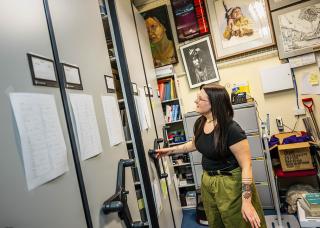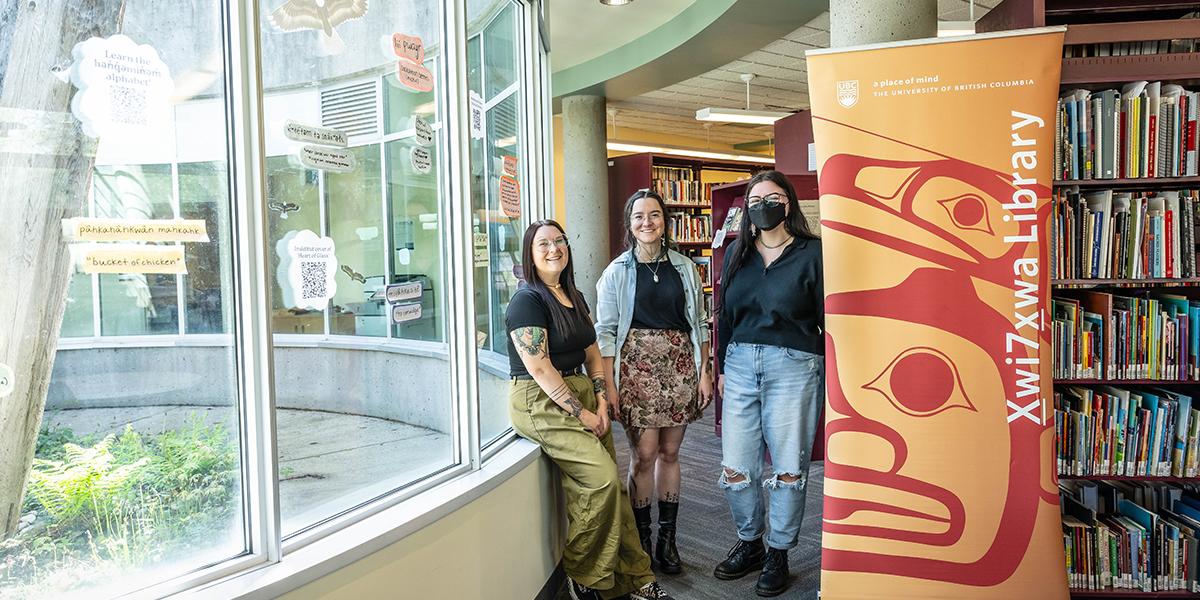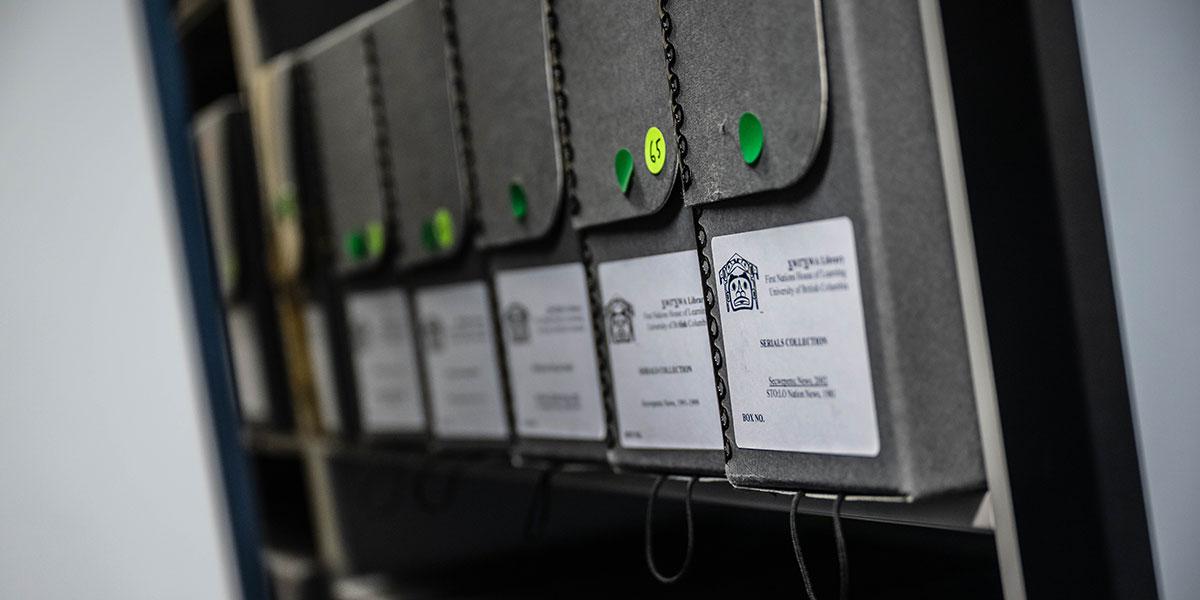Inside X̱wi7x̱wa Library, Canada’s only Indigenous branch of an academic library
Meet the librarians who are striving to uplift Indigenous voices while keeping a relevant collection to support the needs of faculty, staff and students at UBC.

Meet the librarians who are striving to uplift Indigenous voices while keeping a relevant collection to support the needs of faculty, staff and students at UBC.

Visit X̱wi7x̱wa (pronunciation) Library and you will find a space that is dedicated to preserving First Nations’ heritage in British Columbia.

As the only Indigenous branch of an academic library in Canada, X̱wi7x̱wa Library is used by Indigenous community members and UBC students, faculty and staff who require resources for Indigenous-specific queries. Housed in a replica pithouse or kekuli house – a traditional Salish winter dwelling – it is a branch of UBC Library and is situated next to the First Nations House of Learning on the Vancouver campus.
The library is seen as a leader in Indigenous Academic Librarianship (which is the uniting of the traditional discipline of librarianship with Indigenous approaches to knowledge, theory and research methodology). As a result, it actively reaches out to invite Indigenous communities to use the facility (for example, through the Indigenous borrower card). In addition, its collection is presented in a way that is designed for flexibility and to reflect local Indigenous communities, rather than grouped in the general history section.
Acting Head Librarian, Kayla Lar-Son; Information Services Librarian, Karleen Delaurier-Lyle; and Indigenous Metadata Librarian, Taya Jardine have a deep respect for the 12,000 items they oversee (including 6,000 books, 450 videos, 5,000 vertical file materials, curriculum resources, journals and newspapers, maps, posters, theses and dissertations, the G.A. (Bud) Mintz special collection and some archival materials). They are particularly careful to protect the “treasured” items in the library archive (such as Indigenous language revitalization content and photo collections).

“Archives and books are like relatives to us. They embody the stories and knowledges of those who have gone before us. We want to protect these materials so they can still be here, or with the communities they are supposed to be with, for future generations,” Kayla shares.
Other UBC Library branches use the Library of Congress classification system, resulting in Indigenous materials being placed in the E99 category: ‘Indian tribes and cultures.’ X̱wi7x̱wa Library uses an Indigenous classification system (a modified version of the Brian Deer classification system). “This allows us to [showcase] Indigenous perspectives on everything from Indigenous history and ethno-botany, to literature, film and curriculum, rather than being all together based on identity,” says Taya.
Further work is underway to present the collection in an accessible way that allows space for a variety of experiences and needs. “We wish to create a community sense to the space,” Taya explains.
For example, an Indigenous community member may require privacy and empathy when discovering a previously unseen photograph of themselves, or a faculty member or student may need assistance while perusing the shelves for a resource to help bolster their curriculum or aid their understanding of Indigenous perspectives.
“As the only Indigenous branch of an academic library, a lot of what we do here is honouring the past and the folks who started this collection and the systems that had to be broken for this to happen, while looking towards the future,” Kayla reflects.
Since the launch of UBC’s Indigenous Strategic Plan in 2020, X̱wi7x̱wa librarians are seeing increased demand for assistance with Indigenous referencing queries from faculty and students. This is due to ongoing efforts at the university to indigenize the curriculum and to engage with Indigenous perspectives and Ways of Knowing.
“Our scope has broadened,” Kayla explains. Traditionally, the library received requests from humanities-focused Faculties. “We are now being called upon for support from Faculties we didn’t previously have a relationship with such as health and sciences,” she observes.
“We are also seeing a resurgence in land-based practices,” Karleen explains. She has worked with the Faculty of Land and Food Systems, the Faculty of Forestry and the Indigenous Land-Based Health, Wellness, and Education Research Cluster to lead them in traditional practices such as ceremonial fire or salmon smoking.
“As the only Indigenous branch of an academic library, a lot of what we do here is honouring the past and the folks who started this collection and the systems that had to be broken for this to happen, while looking towards the future.”
Acting Head Librarian, Kayla Lar-Son

“We regularly offer tailored instruction to faculty or signpost them to colleagues across the university, such as the Centre for Teaching, Learning and Technology,” explains Karleen, who was part of a working group which established a training program for all UBC Library staff to help share the responsibility for dealing with the growing demand.
The growth of Artificial Intelligence (AI) is something the librarians are keeping a close eye on. Kayla comments: “I think AI is one of those technologies that there’s potential for it to benefit Indigenous communities but there’s also a risk of serious harm to Indigenous communities from the inappropriate or mis-informed sharing of knowledges out to the masses.
“Our Elders never expected their knowledges and words to be made publicly available like they can be now – we are having to walk that balance with AI.”
The ongoing demands from Indigenous communities across Canada for data sovereignty (i.e. First Nations, Inuit and Métis peoples receiving control over records collected from and pertaining to them) is also on their radar. “What would data sovereignty mean for our collection?” Taya ponders.
Looking ahead, they are re-evaluating the development of the collection in the years to come. “We are really focusing in on Indigenous Peoples’ own voices and stewarding knowledges that have been presented by authors who are writing about their own communities, cultures and understandings of things from a community-based perspective. This is opposed to some of the older parts of our collection which are from a time when Indigenous folks weren’t being published or allowed access into academia like we are now – how do we effectively make that transition into really focusing on and upholding Indigenous Peoples writing about themselves?” Taya states.
Kayla explains that they are focused on finding a balance between ensuring the collection upholds Indigenous Peoples writing about themselves, while catering to the growing curriculum needs of the UBC community.
She says: “We are asking ourselves: ‘How do we support Indigenous authors, artists, researchers and uplift their voices while keeping a relevant collection to the research and curriculum supports that are needed across UBC faculties right now?’”
To find out more about how X̱wi7x̱wa Library supports faculty and staff, visit this page,
Alternatively, reach out to Kayla (kayla.lar-son@ubc.ca) to book an introductory tour.
Written by Meadhbh Monahan, UBC Internal Communications
Interviewed in May 2024
“We are asking ourselves: ‘How do we support Indigenous authors, artists, researchers and uplift their voices while keeping a relevant collection to the research and curriculum supports that are needed across UBC faculties right now?’”
Acting Head Librarian, Kayla Lar-Son
Find the latest news, updates, events, and useful dates from across UBC, curated for faculty and staff by Internal Communications.
Access a library of resources from multiple UBC websites, all in one place.